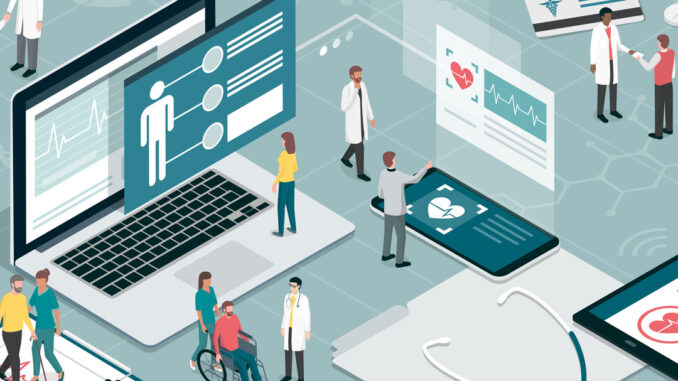
For many of us, especially snowbirds and those without a regular family doctor, the retention of personal health information, medications, laboratory results, imaging details and immunizations is extremely important, yet many do not have such detailed information readily available. In past years, having the same family doctor and taking limited trips away from home, immediate access to such information was rarely a necessity. As we age, in particular, we often have a list of past and present conditions and medications that could be of great importance to a new doctor whom we may need to see. A doctor whom we may encounter while travelling or even in our own community – such as at a walk-in clinic or emergency room – will usually have no access to your medical information.
Acquiring Personal Health Records
Surveys show that many people arriving in emergency rooms are unclear about their medical conditions and the names and dosages of medications which they take. This can compromise their diagnosis and care. Carrying a wallet card listing past and present conditions and exact medications and dosages is important. I remember that, at one CSA show, a woman suddenly collapsed and, being unconscious and alone, it was unknown what caused the collapse. Opening her purse, I saw a sheet with her records indicating that she was a Type I diabetic and was probably suffering from insulin shock. We were able to revive her by the time the ambulance arrived.
Unnecessary or repetitive investigations may ensue when details of a person’s health are unavailable or forgotten. There are companies which will retain your information and are then able to immediately transmit that data through the internet to any provider that you authorize. An example is ca.emergencyid.com, where you document the information including laboratory and imaging results. You or a family member then give the pass code to the provider when care is needed. If you choose to keep a hard copy of your health information, always include any important document such as a recent ECG if you’ve had heart problems, or an important laboratory report or imaging result. Medical alert bracelets are often worn for immediate notification about conditions such as diabetes and drug allergies.
Although the technology for sharing medical information among hospitals, doctors, laboratories and imaging facilities has been available for more than 30 years, universal adoption is sorely lacking. Acquiring results yourself is now possible through online sites which allow the patient to read and save lab test results and imaging reports. Each province may have different companies that provide such services. In Ontario, Lifelabs and Dynacare are two laboratories which provide this service in many areas. Imaging results such as X-ray, CT and MRI scans can now be downloaded in many Ontario sites from both hospital and community facilities through PocketHealth.
Getting copies of personal health records is only necessary if one’s past medical conditions are numerous or complex. Copies of scans, lab results, past immunizations, current medications or important investigative tests such as an ECG may be especially critical if your doctor is retiring or you are travelling. Of course, such records may also be useful in order to provide accurate information when applying for travel health insurance. Doctors are required to retain patient records in some form long after their practice is closed. A reasonable charge to acquire your records should be expected. Provincial health insurance programs can provide only the dates and type of services provided.
Seeking Disease or Symptom Information
When I started my family practice, it was common for a patient to show me a Reader’s Digest medical article during a visit and ask for my opinion as it related to their condition. Now that access to the internet and its thousands of websites and articles is available to both patients and health-care providers, useful current information can profoundly improve the quality of medical diagnosis and treatment. Individuals are able to research their symptoms, determine what might be the urgency for care, as well as possible causes and cures before seeing a health-care provider. Some patients have even come upon a potential diagnosis which had been missed by one or more professionals on previous examinations. Two such patients have told me their stories. One was a young woman who, after several visits to her doctor without a diagnosis, researched her symptoms online and determined that she might have Lyme disease even though she did not remember receiving a tick bite. Her subsequent test was reported as positive and treatment was initiated. A snowbird who had returned to Alberta after his holiday in Arizona experienced numerous symptoms which went undiagnosed for months until he read about Valley Fever, a fungal infection common in a few southwestern states. His doctor, unfamiliar with this condition in Canada, directed his attention to this infection which was then confirmed and treated.
It’s very important to be sure that the website providing the medical information is reputable. Just look at Facebook to see what wild assertions are sometimes made. Reputable sites include WebMD.com, MayoClinic.org, Hopkinsmedicine.org, canada.ca/en/health-canada and Drugs.com. For individuals with specific medical conditions, there are websites that you should examine which offer pertinent information about a certain particular diagnosis such as diabetes, (diabetes.ca) heart disease (heartandstroke.ca) and kidney disease (davita.com, kidney.ca). Such sites applicable to your particular condition should provide you with a wealth of information about management, recommended drugs and preventive measures to ensure optimal outlook. It also allows you to more intelligently discuss your condition and ask the right questions when being followed by your doctor.
Health-care providers also have a significant advantage by accessing needed medical information. General and specialist sites are accessed through the physician’s cellphone or tablet, allowing for immediate attention to the latest recommended diagnostic and treatment initiatives. Health care is evolving rapidly and this current information is much better than the use of medical textbooks that were often published years ago.
Health Information For Travellers
Snowbirds and others who travel to foreign countries, even for short periods, should pay particular attention to recommended initiatives before leaving Canada. While most visits to the U.S. or Europe require no additional immunizations, some countries may expose you to such illnesses as hepatitis, yellow fever, cholera, meningococcal disease and others. Before travelling, determine whether or not you might need particular immunizations. On cdc.gov or canada.ca/en/health-canada, the health section outlines what vaccines or precautions are needed for certain countries, or ask your doctor or travel medical clinic what measures you should take. Travel insurance policies often do not cover benefits for travel to countries listed by Health Canada that are under travel warnings. Be sure to check for this information.
Of course for all travellers, up-to-date vaccinations should be in effect and preferably documented. For most seniors, this should include being fully vaccinated for diphtheria, polio, tetanus, influenza, Covid, pneumococcal pneumonia and shingles. If it has been longer than six months since your last Covid booster or since you had Covid, current recommendations are that you get boosted before leaving.
Most of us have had many immunizations, medical conditions both past and present, medications and many diagnostic tests. All of us should retain some record of our important medical information. For travellers and the one in five people who do not have a regular family doctor, this is essential. A physician trying to determine the diagnosis and best treatment for a new patient can be greatly assisted by the possession of accurate information regarding the patient’s past and present conditions and treatment.
